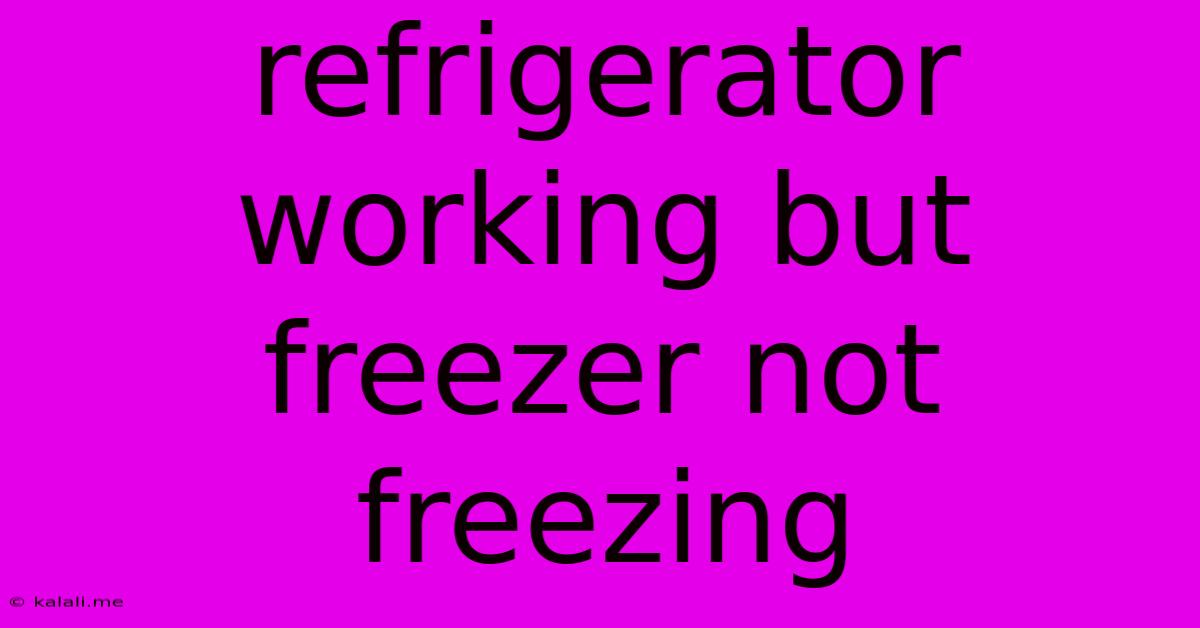Refrigerator Working But Freezer Not Freezing
Kalali
Jun 05, 2025 · 4 min read

Table of Contents
Refrigerator Working, Freezer Not Freezing: Troubleshooting Your Appliance
Is your refrigerator humming along happily, keeping your milk perfectly chilled, but your freezer stubbornly refusing to freeze? This frustrating issue is more common than you might think, and often stems from easily fixable problems. This guide will walk you through troubleshooting your appliance and getting your freezer back to its frosty best. Before calling a repairman, let's explore some common causes and solutions.
Why is my refrigerator working but my freezer not freezing? This is often due to issues with the freezer's components, including the condenser coils, defrost system, or even the door seals. Let's delve into the specifics.
1. Check the Freezer Door Seal
A faulty freezer door seal is a frequent culprit. Warm air leaking into the freezer prevents it from reaching the desired temperature. Conduct a simple test: Place a piece of paper along the door seal, then close the door. If the paper pulls out easily, you have a leak. A replacement seal might be needed. You can find these seals online or at appliance parts stores. Replacing it is a relatively straightforward DIY project.
2. Inspect the Condenser Coils
The condenser coils release heat generated by the refrigerator's compressor. If these coils are clogged with dust and debris, they can't effectively dissipate heat, leading to poor freezer performance. Locate the condenser coils: They are usually located at the back or bottom of the refrigerator (check your manual for the exact location). Clean them gently: Use a vacuum cleaner with a brush attachment to remove the dust. For stubborn dirt, a coil cleaning brush can be helpful. A significant improvement in cooling capacity is often seen after this cleaning.
3. Investigate the Defrost System
Ice buildup in the freezer can hinder its ability to maintain the correct temperature. The defrost system, which includes a defrost heater and thermostat, melts this ice. If the system malfunctions, ice will accumulate. Look for excessive ice buildup. A clogged drain line can also contribute to ice buildup. If you see extensive ice, you may need to defrost the freezer manually (unplug the appliance, let it thaw completely). This is a more labor-intensive solution, and if it happens frequently, it suggests a problem with your defrost system, requiring professional attention.
4. Assess the Evaporator Fan
The evaporator fan circulates cold air throughout the freezer compartment. A malfunctioning fan can result in uneven cooling or a failure to reach optimal freezing temperatures. Listen for the fan: Is it running? If not, or if it's making unusual noises, the fan motor may be faulty. Replacing this part requires some technical skill, possibly necessitating professional help.
5. Examine the Thermostat
The thermostat controls the temperature within the freezer. If it’s malfunctioning, it may not be sending the correct signals to the compressor, resulting in insufficient cooling. Check the thermostat settings: Ensure they're set to a sufficiently low temperature. If the problem persists, the thermostat itself might need replacing.
6. Consider the Compressor
The compressor is the heart of the refrigerator, responsible for circulating refrigerant. A faulty compressor is a serious problem, often requiring professional repair or replacement. Listen carefully: Does the compressor run consistently? If it’s not running at all or is making unusual noises, a compressor issue is likely.
7. Check the Refrigerant Level
Low refrigerant levels can severely hamper the cooling capacity of your refrigerator. This is a more complex issue requiring professional attention, as refrigerant handling requires specialized equipment and knowledge. However, a low refrigerant level usually manifests as poor cooling in both the refrigerator and freezer sections, not just the freezer.
When to Call a Professional:
If you've gone through this checklist and the freezer still isn't freezing, it’s time to contact a qualified appliance repair technician. Issues with the compressor, refrigerant, or major internal components usually require professional expertise. Don't attempt repairs beyond your skill level; you risk further damage and potential safety hazards.
By systematically investigating these common causes, you can often resolve the problem of a refrigerator working but a freezer not freezing, saving time and money. Remember safety first, and don't hesitate to call for professional help if needed.
Latest Posts
Latest Posts
-
Can You Buy A Toilet Tank Separately
Jun 06, 2025
-
Is Spirit Savers Club Worth It
Jun 06, 2025
-
Why Do You Let Him Eat Sand
Jun 06, 2025
-
Does Spraying Your Roof With Water Cool Your House
Jun 06, 2025
-
Can Muslims Have Sex During Ramadan
Jun 06, 2025
Related Post
Thank you for visiting our website which covers about Refrigerator Working But Freezer Not Freezing . We hope the information provided has been useful to you. Feel free to contact us if you have any questions or need further assistance. See you next time and don't miss to bookmark.